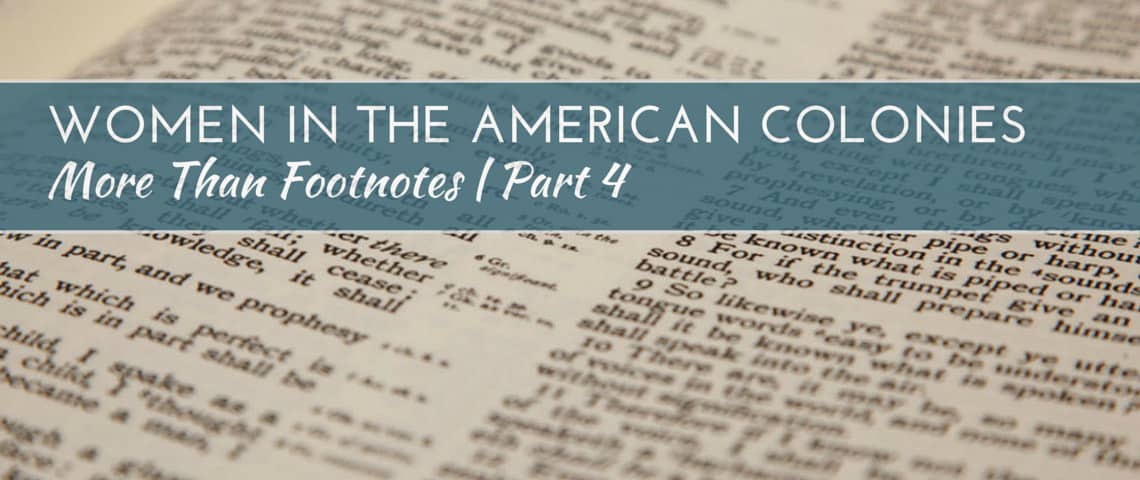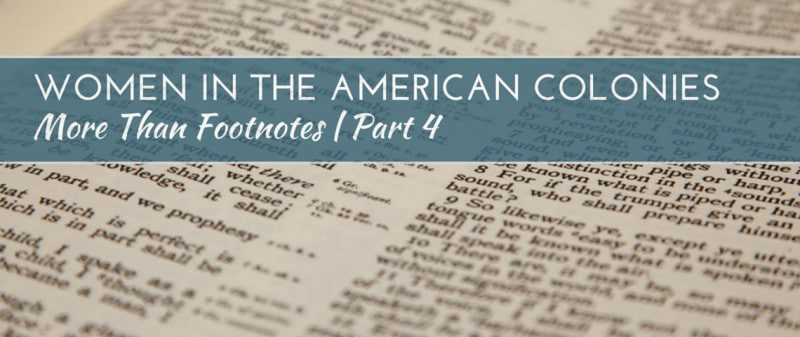Part 4 in a series examining the role of women leaders in different phases of Church history. Part 1 – Women in Early Church History, Part 2 – Women in Medieval Christianity, and Part 3 – Women in the Reformation Era.
The Context
At the dawn of American colonization, Puritanism became a dominant religious force, and was the political and moral standard for American cultural development. The moral vision of the Puritans was so influential that Mark Noll suggests almost all Americans until the 19th century can be seen as reacting to this religious body (HCUS, 40).
While other Christian movements emerged from 17th century America—the Quakers, Baptists, Presbyterians, and Anglicans, for example—it is through the literary tradition of the Puritans that most of our knowledge of American women in Church leadership survives.
As the Puritans placed more emphasis on the elements of love, trust, and mutuality, the historical memories of women as evil and easily inclined to sin began to fade. Though women would still be regarded as the “weaker sex”, MacHaffie notices that “Colonial clergymen also began to replace the image of women as inherently evil with the idea that men and women…possess equal opportunities for redemption” (HS, 145).
With the influence of the First Great Awakening of American religion (1730s-1740s) as impetus, women in American Christianity were driven by the experience of conversion to transcend prescribed roles and self-understandings. Though governmental legislation and Church policy would remain hierarchical, women in the earliest days of America stand as impressive examples that the Spirit works through the marginalized to bring liberation to all. While the three women featured below are of primary importance in Church history, countless names are left out of this post simply due to space.
THE WOMEN
Anne Hutchinson
Unable to receive formal education, Puritan Anne Hutchinson (1634) developed a sharp theological mind as she dedicated her time and energies to studying the work of Puritan preacher John Cotton. After marrying at age 21 and giving birth to several children, Hutchinson started leading women’s meetings in her home where she would teach theology and offer her understandings of Scripture.
Initially, Hutchinson was praised for her pious hospitality. However, when men began attending her meetings, a Puritan code was broken and Hutchinson was accused of attempting to lead a rebellion that threatened the social order of the entire Massachusetts Bay Colony. With little to no distinction between Church and state, Hutchinson’s actions led to a civil trial.
In her court trial, Hutchinson was accused of advocating several heresies. The academic that she was, Hutchinson was initially able to defend against and outwit her accusers for a time. Just as it seemed she would receive no civil punishment, Hutchinson made the fatal mistake of suggesting that not only did the Holy Spirit remove the need for magistrates and clergyman to preside as religious authorities, she also mentioned that God spoke to her directly on religious matters. In the spring of 1638, a pregnant Hutchinson was excommunicated from her colony and sent into exile. Due to the immense dangers of traveling alone on the frontier, such a punishment likely could have resulted in death.
While tragedy would strike in the form of miscarriage, Hutchinson and her family eventually found a home in Rhode Island—a place with much more religious diversity than Boston. There, Hutchinson continued to use her academic and lay medical abilities to inspire others. Her legacy stands as representative of women who challenged “weaker sex” assumptions (see also Sarah Osborn 1760 and Ann Dutton 1747), but also battled wider injustices in the social order.
Margaret Fell
Quaker Margaret Fell (1614-1702) is hands down one of my favorite figures in 17th century history. Though her story begins in England, Fell also spent some time in America with her husband George Fox. Sometimes called “the mother of Quakerism”, Fell’s marriage to George Fox is a striking example of an early egalitarian marriage and ministry partnership (see also Sarah Edwards 1742).
Fell was born under the rule of Charles II and within the context of a newly restored Anglicanism in England. In the wake of Anglicanism’s demand for religious uniformity, Quakers such as Fell risked their lives and well-beings because their non-Anglican convictions were seen as direct threats to the political-religious system of England. It is in this context that Fell’s (too often overlooked) classic Women’s Speaking Justified (1666) was born.
A prophet with a fire in her belly, Fell’s Women’s Speaking Justified argues that ministers and clergy have misunderstood scripture’s instruction on women. With awesome intellect and Martin Luther-like rhetoric, Fell dissects the relationship between women and God, Jesus, the Holy Spirit, the Hebrew Prophets, and the Apostle Paul.
Her arguments, which unfold in ways strikingly similar to modern day egalitarian scholarship, show that the notion of women’s equal access in the Church is not primarily a modern phenomenon arising out of 20th century feminism. With passion, Fell clearly reveals that the arguments for women sharing full access in the Church are grounded in centuries of prophetic, faithful Christian conviction. (For example, while Fell confesses that women are “the weaker sex”, she argues this means they are well equipped to be servants with complete access to all Church roles.)
Not surprisingly, Fell’s published thoughts on women in the Church, her underground teaching, and her refusal to swear oaths to the Anglican King Charles II led to many episodes of imprisonment over her lifetime. Her example stands as a prolific leader in the wake of a long Quaker tradition of practicing gender equality in religion.
Jarena Lee
The history of women in early American history would be incomplete without reflection on Jarena Lee (1783). Lee was a traveling preacher who in 1827 traveled over 2,000 miles and preached on 180 different occasions (Noll, 204). Commissioned by Richard Allen, the founder of the African Methodist Episcopal Church, Lee became the first black woman to preach in America with denominational approval.
As a woman and a person of color, Jarena Lee faced life-threatening hostility in her travels. From the detailed record she kept of her journeys and early life, we know that Lee also faced internal hostility in her dealings with suicidal thoughts. Her preaching, which focused on holiness and sanctification, remains a powerful example of revival thought—particularly in the Methodist tradition in which she propped open the doors for female ordination.
Challenging almost every social barrier, Lee’s story and influence, like so many women of this time, speak to human rights issues deeper and wider than just equal gender access in the Christian Church.
References:
MacHaffie, Barbara J. (2006). Her Story: Women in Christian Tradition (2nd Edition). Fortress Press
Noll, Mark A. (1992). A History of Christianity in the United States. Eerdmans Publishing.
Part 1 – Women in Early Christianity, Part 2 – Women in Medieval Christianity, and Part 3 – Women in the Reformation Era.
This series originally appeared on Restoring Pangea, where Michael blogs along with Josiah Daniels and Nathan Smith.





3 responses to “More Than Footnotes Part 4: Women Leaders in the American Colonies”
For more on Jarena Lee, check out my anthology of first-source material from eighteen American women evangelists, Turn the Pulpit Loose: Two Centuries of American Women Evangelists (Palgrave Macmillan, 2004). Lee is the first evangelist featured. Priscilla Pope-Levison, Professor of Theology and Women’s Studies, Seattle Pacific University
Thank you for this. I did not know of either Fell or Lee.